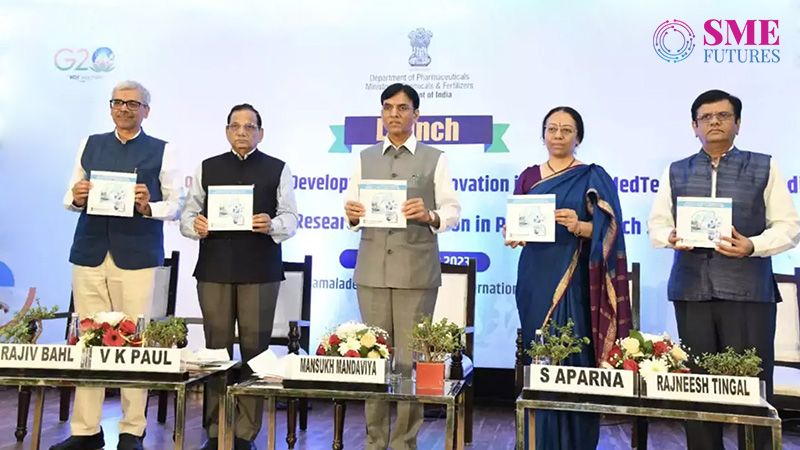India’s pharmaceutical industry has long been a global player, holding the esteemed position of the world’s third-largest pharmaceutical market by volume, with a current market size of approximately USD 50 billion. However, as the world of healthcare and medicine rapidly evolves, the Indian pharmaceutical sector has recognized the need to step up its game in the innovation arena.
To catalyze this transformation, India has introduced both a National Policy on Research and Development and Innovation in the Pharma MedTech sector and the Promotion of Research and Innovation in the Pharma MedTech Sector (PRIP) scheme.
While launching the policy on September 26, 2023, Dr Mansukh Mandaviya noted the scheme will focus on transforming India into a high-volume, high-value player in the global market of pharmaceuticals, meeting the quality, accessibility, and affordability goals. He further stated, “The policy will help to create an ecosystem of skills and capacities including the academia and the private sectors, and give impetus to new talent among the youth through start-ups.”
National Policy on Research and Development and Innovation
Under the Allocation of Business Rules, the Department of Pharmaceuticals has been entrusted with the task of promoting and coordinating research in pharmaceuticals, education, and international cooperation in pharmaceutical research.
In September 2020, a high-level Inter-departmental Committee was established to draft a policy on R&D and Innovation in Pharmaceuticals & Medical Devices. The result was the “Policy to Catalyse R&D and Innovation in the Pharma MedTech Sector in India,” which aims to nurture an entrepreneurial environment conducive to drug discovery and innovative medical devices.
This policy was officially gazetted on August 18, 2023, and is built upon three main pillars:
- Regulatory Environment: The policy seeks to create a regulatory framework that fosters innovation and research in product development, extending beyond traditional safety and quality concerns.
- Incentives: A mix of fiscal and non-fiscal measures will be employed to incentivize private and public investment in innovation.
- Ecosystem Building: An enabling ecosystem will be established, providing a solid institutional foundation for sustainable growth in the sector.
Additionally, India plans to establish an Indian Council of Pharmaceuticals and Med-tech Research and Development to facilitate collaboration between industry, academia, and research institutions. This initiative aims to promote domestic and international partnerships in R&D in Pharma Med-tech sectors.
The policy’s potential impact is vast and promising. It is expected to contribute significantly to India’s GDP, boost exports, enhance drug security and availability, improve healthcare indices, reduce disease burdens, create high-end R&D jobs, and attract Indian talent with expertise in research and innovation back to the country.
Promotion of Research and Innovation in the Pharma MedTech Sector (PRIP)
Recognizing the need to enhance its presence in high-value pharmaceutical production and world-class R&D, India has introduced the PRIP scheme with a budget of Rs. 5,000 crores, notified through a Gazette notification on August 17, 2023. The primary objective of PRIP is to transition India’s pharmaceutical sector from cost-based to innovation-based growth by strengthening research infrastructure.
PRIP comprises two components:
Component A: This component focuses on strengthening research infrastructure through the establishment of seven Centers of Excellence (CoEs) at the National Institutes of Pharmaceutical Education and Research (NIPERs). These CoEs will receive financial support amounting to Rs. 700 crores.
Component B: The second component promotes research in pharmaceuticals by encouraging collaboration between the private sector, government institutes, and academia. Financial assistance, totalling Rs. 4,250 crores, will be provided to support research in priority areas such as New Chemical Entities, Complex generics including biosimilars, medical devices, stem cell therapy, orphan drugs, and Antimicrobial resistance.
The benefits of the PRIP scheme are manifold:
- Development of Research Infrastructure: It will facilitate the creation of a world-class research environment, nurturing a pool of highly qualified and trained students.
- Industry-Academia Linkages: PRIP will promote collaborations between the private sector and government institutes, strengthening industry-academia partnerships.
- Focus on Priority Areas: The scheme will help India’s pharmaceutical industry leapfrog by focusing on priority areas, positioning it as a leader in global pharmaceutical innovation.
- Commercially Viable Products: PRIP aims to drive the development of commercially viable products, boosting revenue, and generating employment opportunities.
- Affordable Healthcare Solutions: By addressing primary areas of health concern, PRIP will contribute to the development of affordable, accessible healthcare solutions, reducing the overall healthcare burden.
India’s pharmaceutical and medical technology sectors are poised for an exciting transformation with these groundbreaking initiatives. By fostering innovation, encouraging research and development, and creating a conducive ecosystem, India aims to not only expand its presence in the global pharmaceutical market but also make significant strides in improving healthcare for its citizens and the world at large. These endeavours are not just policy measures; they are India’s bold step towards a healthier and more prosperous future.











